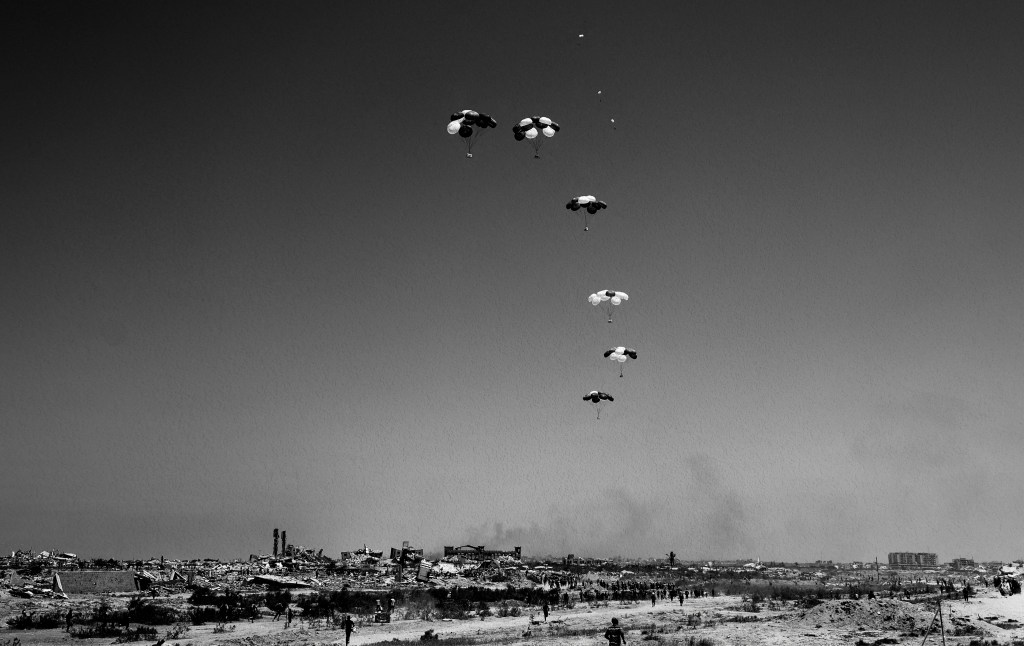Hey,
The claim that Gaza was an “open-air prison” has a long pedigree in anti-Israel propaganda. But in the wake of October 7, when defenders of Hamas desperately needed to provide some “context” to justify the rape and slaughter of Hamas, it went viral, popping out of the mouths of journalists and government officials all around the world.
Media analysis firm MEMRI has a useful compilation of videos on what Gaza looked like prior to the war—which was launched by Hamas, not Israel, in case you’re confused about that. If you watch, say, Al Jazeera’s 2017 report on Gaza’s economic boom, complete with shopping malls, crowded beaches, and a water park, it certainly doesn’t look like the prison or “concentration camp” described by all of those statesmen, intellectuals, journalists, or U.N. poohbahs and satraps.
As a non-paying reader, you are receiving a truncated version of The G-File. You can read Jonah’s full newsletter by becoming a member here.
The numbers never really backed up the prison claim either. Every day, prior to October 7, Palestinians left Gaza for work in Israel. Moreover, roughly a quarter of a million young Palestinians migrated left to work or study abroad in the decade and half prior. Israeli Prime Minister Benjamin Netanyahu has been heavily criticized—with some merit—for allowing billions in Qatari and other aid money to get funneled to Hamas. Netanyahu justified it on the grounds that it was necessary to fend off a humanitarian crisis, but also because he was fixated on the Iranian threat, and critics say, was fooled into thinking Hamas didn’t pose much of a problem. Total foreign aid to Palestinians (Gaza and the West Bank) from 1994 to 2000 amounted to $40 billion.
Now, there’s much to criticize about Israeli policy toward the Palestinians generally and Gaza specifically. I may not agree with all of the criticisms, but fair-minded people can make all sorts of good-faith objections that have merit. But suffice it to say, the “open air prison” and “concentration camp” verbiage deployed by Israel’s detractors was, at a minimum, dubious or debatable and, at worse, slanderous nonsense.
But there is one way in which it fits. Gaza may not be a prison, but Hamas is a prison gang.
Hamas is also an Islamist, genocidal death cult. But in practical terms, most of the time, it runs Gaza like a prison gang. This shouldn’t surprise anyone. Prisons and terror groups have had a chicken-and-egg relationship for generations. The Muslim Brotherhood, Islamic Jihad, ISIS, the Irish Republican Army, Bolsheviks, various American neo-Nazi groups, various far-left European terror outfits—the list goes on. What’s special about Hamas is that it operates like a prison gang when not in prison.
In his brilliant book, The Social Order of the Underworld: How Prison Gangs Govern the American Penal System, David Skarbek runs through how prison gangs regulate violence, enforce order, control resources, and manage access to black markets. That’s what Hamas does in Gaza. It’s not the only player in Gaza. Palestinian Islamic Jihad, the Popular Resistance Committees (PRC), elements of Fatah (which controls the West Bank), and various clans. But Hamas is the big kahuna. The armed violence that falls on aid convoys isn’t all orchestrated by Hamas, but it’s a safe bet that most of it wouldn’t happen without Hamas allowing it or directing it.
Within Gaza, Hamas has the most trappings of a government, the most guns, the most men, the most money, and the most connections with external governments and aid agencies —and it gets its slice of what comes into Gaza. In short, to the extent Gaza has a government, Hamas is it. And the international community and the Western press treat it as the government.
Except when it’s not.
We’ll often hear how Hamas has a “militant” or “military wing”—which goes by the name the Al-Qassam Brigades. And it’s true the Hamas military does have a name, just like branches of the American military have names—the Marines, the Navy, the Army, etc. But just like the American military is to the U.S. government, the Hamas military is an extension of Hamas. Matthew Leavitt wrote a whole book demolishing what he calls “the myth of disparate wings.” Indeed, on paper at least, the U.S., EU, and Canada treat Hamas as a singular, cohesive terrorist organization, not a civilian government with an unruly terrorist wing. As a matter of diplomacy, however, Hamas is a terrorist organization when it commits terrorism and a kind of de facto government the rest of the time.
But you know who else recognizes Hamas as a unified entity? Hamas. Hamas’ internal messaging and Arabic-language propaganda rarely, if ever, peddle the fiction that the Al-Qassam Brigades are doing anything other than carrying out the mission of Hamas itself. That’s because it’s all one mission.
But the fiction is important for critics of Israel and defenders of Hamas. If Hamas is simply a terrorist organization, then giving it money is funding terrorists. If, however, you can claim there’s some sort of humanitarian or civilian “wing” that is meaningfully distinct from the “militants,” then it’s much easier to cut checks and roll in aid trucks.
Here’s ABC News explaining that “The militant wing of Hamas, which has strong ties to the group’s political arm, was formed in part as a response to Israeli policy.” Get it? Hamas wasn’t formed with the clear, obvious, and stated goal of destroying Israel. No, the only reason it has a “militant wing” is to respond to “Israeli policy.” In other words, the only reason Hamas attacks Israel is because Israel asked for it. It’s a bit like saying the Nazis created the SS as a response to Jewish resistance.
The best example of this willing credulity for Hamas propaganda is Gaza’s health ministry.
Since October 7, media outlets—and even the Biden administration—have referred to the Gaza Ministry of Health as if it’s somehow not even connected to Hamas’ “political wing,” never mind its military wing, even though it has routinely lied, dissembled, distorted Palestinian casualty numbers. But even if its numbers were right, this leaves out the well-documented fact that Hamas has used hospitals, ambulances, and patients as military resources and human shields—all of which are war crimes.
War crimes all the way down.
But that’s the point: War crimes are Hamas policy. Not the policy of the military wing, but of Hamas, period. The founding charter of Hamas calls for the total destruction of Israel. That’s genocide. And genocide is a war crime. You may have noticed that the only time Hamas fighters wear uniforms is when they’re not fighting—at ceremonies and other photo-ops. Not wearing a uniform during a war, at least in the way Hamas routinely does it, is a war crime. (Fun fact: It’s considered “perfidy.”) Taking civilians hostage? War crime. Releasing photos of abused hostages? War crime. Abusing hostages? War crime. Rape and murder of civilians? War crime. Using civilians, mosques, schools, and hospitals to mount military operations? War crime, war crime, war crime.
It would be harder to list the Hamas policies that aren’t war crimes, because Hamas is a war crime enterprise.
But none of this takes away from the fact that Hamas runs Gaza. It’s not a government, though. It’s a prison gang and cult. When America dropped nuclear bombs on Japan, the Japanese government—which was pretty militant—surrendered. Why? To save Japanese lives. That’s what governments do when they lose a war. It may take a long time, and the surrender might require a coup or threat of a coup. But governments accept defeat when they are defeated, and a key way of convincing governments that they’re defeated is demonstrating that they cannot defend their land or their people anymore. Going back to the first city-states, this is what the state has always been for: protecting the people. Sure, the rulers often got the better end of the deal, but the idea of the ruler being the protector or father of the people is an ancient justification for power.
Do you get prison gangs to surrender by killing ordinary inmates? No. The non-member inmates were always nothing more than a resource, a market, a means of self-enrichment. Why should the Aryan Nation care if you kill members of a black prison gang, never mind random unaffiliated inmates? The gang, not the prison nor its inmates, is its only concern. That’s why Hamas says disarmament is off the table. Hamas would rather stop being in charge than stop being a gang.
Indeed, Yahya Sinwar, the Hamas leader killed last year, always championed a strategy of sacrificing Gazan civilians in exchange for winning the propaganda and diplomatic war. His goal was to use mounting civilian deaths as a way to get the world to turn on Israel and to simultaneously break the will and confidence of the Israeli people.
This is important because a lot of people—from heads of state to average news consumers—seem to believe that Hamas is a government and that at some basic level it behaves like one. Even some of the people who condemn Hamas for its behavior still hold onto the assumption that Hamas is undermining its cause by not behaving differently. What they don’t understand is that Hamas’ cause has nothing to do with protecting Palestinians. Hamas simply wants to exploit Palestinians as a means to an end. And the end is defined by their Islamic death cult mode: the destruction of Israel. That’s it. That’s the cause.
Yet the global mob of Israel critics persist in believing that there is some kind of social contract that binds Hamas to caring about the well-being of Palestinians. And, sure, when not under attack, I’m sure Hamas probably does care somewhat about Palestinians, as a resource, market, and means of self-enrichment. No doubt Hamas members care about their own families to some extent. But when forced to choose between the well-being of Hamas or the well-being of the Palestinian people, it’s no choice at all. Hamas comes first.
If Hamas put the lives of civilians first, it would have surrendered long ago. It would work with whoever it could to get aid into Gaza, it would have protected the convoys and helped organize distribution, even if it couldn’t get a piece of the action. It wouldn’t use civilians as human shields. It would wear uniforms in battle—because that’s the point of uniforms, to make sure your civilians don’t get shot by accident. It wouldn’t have appropriated billions in construction materials to build a tunnel system larger than the London Underground to hide in and launch attacks from. If Hamas cared about civilians, it would have invited civilians into the tunnels when Israeli bombs fell. But Hamas’ whole strategy is to leave civilians in harm’s way so that Westerners can blame Israel for the death and destruction.
The result is that it falls to Israel to care more about Palestinians than Hamas does. Hamas is refusing to negotiate because the accumulating deaths and suffering of Palestinians help Hamas. Indeed, European governments have been issuing ultimatums that they will reward Palestinians with a Palestinian state if the misery continues. “Israel must fully comply with its obligations under international law, including international humanitarian law,” the EU declared last month.
I think Israel should comply with its obligations as best it can, but lost in such exhortations is the fact that compliance with international and humanitarian law is very difficult when fighting an organization designed from birth to flout such laws. Again, it’s against international law to deliberately shoot civilians, which is why Hamas fighters dress like civilians—either to prevent getting shot or to ensure that civilians do get shot. It’s a win-win approach.
“The only obligations on Hamas in these [EU and other] statements are to return the hostages,” Seth Mandel writes for Commentary. “All food-related obligations are on Israel. But if the government of Gaza has food, shouldn’t it be pressured to share that food with the civilians who are, we are told, starving?”
Knowing Seth, it’s sadly a rhetorical question.
The off-ramp.
I put the blame for the war entirely on Hamas and its enablers. That said, I personally think the war in Gaza should end sooner rather than later. Israel would be entirely within its rights to continue so long as Hamas doesn’t surrender. But it won’t, because that is its Aesopian nature. Some argue, defensibly, that this is an argument to continue the war and not cave under a dishonest and dishonorable propaganda campaign. Some go on to argue that anyone who says the war should end is betraying or abandoning Israel. I think this is unfair.
At this point, when to end the war is a prudential question. Does Israel gain more from continuing the fighting? I’m open to correction, but I don’t think so. And neither do many Israelis. I don’t think those Israelis are “betraying” Israel. They’re taking stock of Israel’s exhaustion—physical, psychological, economic, and materiel. They’re looking at the fraying of patience and political capital on the international stage. They’re making a judgment call. And while I think it’s entirely warranted to be outraged at the distorted moral laziness and bad faith of the EU, the Western media, the U.N., etc., that moral laziness and bad faith are a political reality that must be taken into account. In international politics, losing an argument doesn’t necessarily mean you’re wrong. Anti-Communists lost the argument to kill Bolshevism in its infancy or after World War II, but that doesn’t mean they were wrong about Communism.
As a strategic matter, I agree entirely that Hamas must be destroyed and deserves to be destroyed. It’s not a noble enterprise. It is not morally or legally legitimate. Defending it, even obliquely, is a profound moral and strategic failing. So, in terms of ends, I agree entirely with those who want it crushed. But in terms of means, I think it will cost too much in terms of time, resources, and political capital, than Israel can afford right now. If Israel continues the war, it’s my fervent hope to be proven wrong (and Israel has an impressive record of proving people wrong). And if it stops the war, it is my equal hope that it successfully returns to the goal of destroying Hamas down the road—for Israel’s sake, and the Palestinians’.










Please note that we at The Dispatch hold ourselves, our work, and our commenters to a higher standard than other places on the internet. We welcome comments that foster genuine debate or discussion—including comments critical of us or our work—but responses that include ad hominem attacks on fellow Dispatch members or are intended to stoke fear and anger may be moderated.
With your membership, you only have the ability to comment on The Morning Dispatch articles. Consider upgrading to join the conversation everywhere.